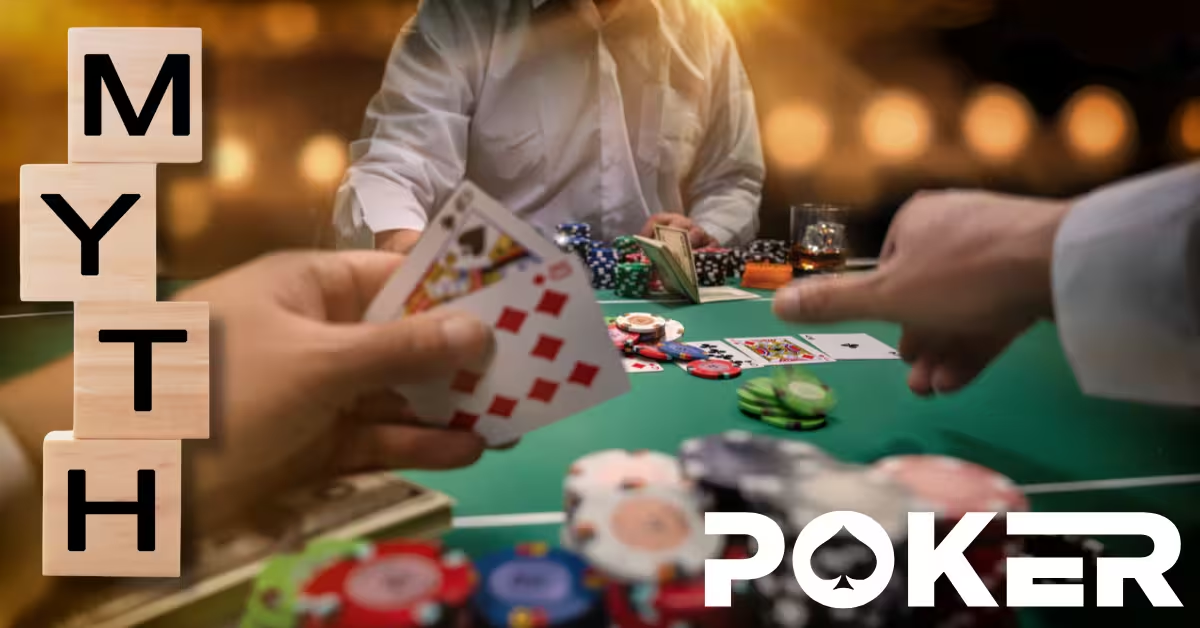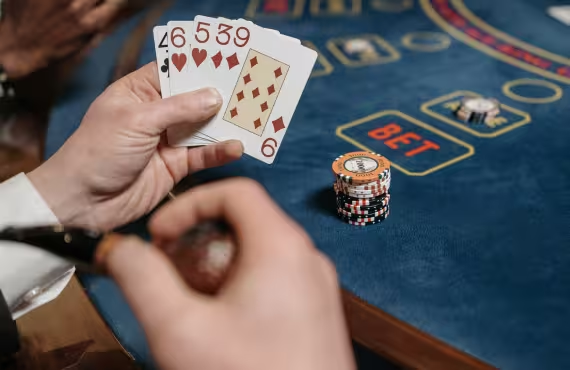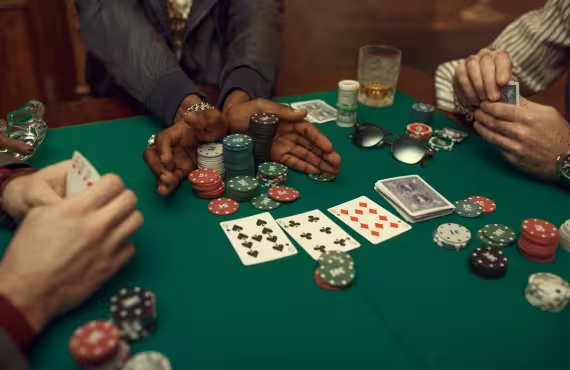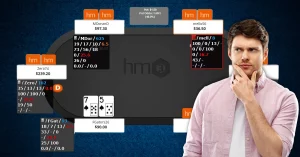5 Poker Myths That Still Cost Players Money

Poker has a funny way of sending otherwise rational people into superstition overdrive. They get a bad beat? That game was rigged. Other players might label you as “scared” if you fold. And if you win without bluffing to the high heaves? Eh, it’s just dumb luck.
Those three things we just said? They are myths. Total nonsense. And there’s a lot more of them floating around in the land of poker. Who started them? We don’t know, but they appear to be passed down from generations before, like family recipes that nobody even bothered to fact-check.
And why have they stuck around for so long? Because if you hear something enough, chances are pretty good you’ll start to believe it. Even if you know it’s not true? You could unconsciously internalize them without realizing it!
We don’t want you to blow up your bankroll, because these errant wives’ tales can cost you money. That’s why we’re gonna bury the most common ones.
What are the 5 poker myths that still cost players money? Let’s get into it so you can evict them, because they have been living rent-free in your head!
Poker Myth #1: ‘Bluffing Is the Most Important Skill in Poker’
Is your poker game built on bluffing bravado? If so, you’re playing in a fantasy land, and you are going to lose money!

The Myth
A lot of new poker players (and, because of the movies, even people who have never played a game of poker) associate winning at poker with bluffing. They picture the protagonist pushing in a huge bluff and scooping the pot with a smug smirk. And this causes players to overvalue bluffing as the end-all, be-all primary skill in poker.
Bluffing is just a single tool in a good poker player’s toolkit, and it’s definitely not the one that’s used most often. Successful poker playing is built on a foundation of solid fundamentals: choosing good starting hands, calculating pot odds, understanding position, and reading your opponents’ tendencies.
Bluffing is a situational weapon; it can tip a close contest or exploit a specific opponent, but it’s not the basis of a winning strategy. If you bluff too frequently? You become predictable and lose credibility, and opponents will catch on and call you down more often, making your bluffs worthless and unprofitable. Most of your profits will come from value betting, strong hands, and making sound decisions, not bluffing every game.
Players who buy into the “bluffing is everything” myth tend to over-bluff. They’re firing at pots left and right, trying to win with weak hands way too often. What happens? They bleed chips when those bluffs get picked off, or they bluff in bad spots and run into easy calls.
Over-bluffing doesn’t just empty your stack; it also makes you super predictable, and that’s something smart opponents will exploit. Ironically, a player who bluffs at every opportunity ends up being easier to read. The truth is that well-timed bluffs have their time and place, but poker rewards balance and good judgment, not constant shenanigans. Focus on solid strategy first; use bluffs sparingly and smartly as a supplement to your skill, not as a regular crutch!
Poker Myth #2: ‘If You Fold, You’re Weak’
This one is a doozy. There is nothing wrong with admitting that you have a crap hand, and anyone who says otherwise is fooling themselves.
The Myth
There’s an ego-driven idea in poker that folding, even if you have a decent hand, is a sign of weakness or cowardice. This kind of weird, macho mentality suggests that “real” poker players never back down and always fight for pots. Wrong!
Folding is in no way a sign of weakness; it’s the opposite. Knowing that you don’t have the cards is a sign of strength and discipline, not weakness.
One of the world’s top poker pros, Daniel Negreanu, says those exact words: “Folding is a sign of strength, not weakness.” Good players know that saving money on a losing hand is just as important as making money on a winning hand. A well-timed fold? It protects your stack. If you suspect you’re beaten, like you have a top pair but you read that your opponent likely hit their flush or set, the strongest play you can make is to muck your cards.
As poker wisdom goes, money saved is money earned. Folding doesn’t feel good, but it does prevent costly mistakes. Every chip you don’t lose is a chip you can use in a better spot later!
A disciplined fold can save you a fortune in the long run. If you’ve put some chips in the pot with a marginal hand, and then face a big raise? Your ego might tell you to call (“I don’t want to be pushed around!”), but the correct move is to let it go.
If you’re beat, throwing more chips at the problem won’t fix it. Continuing in a losing situation is literally throwing good money after bad. If you know you’re likely to be beaten and keep calling, you’re just wasting chips, whereas a fold in that spot preserves your bankroll. The best players have the discipline to make big laydowns and cut their losses. They understand that folding a bad hand early is an important part of long-term winning poker. Far from being weak, it takes a lot of strength to swallow your pride and fold when your hand is second-best.
You’re playing a cash game, and you have a decent hand like top pair, top kicker on the flop. But your opponent makes a hefty raise on the turn, and your instincts (and perhaps some betting pattern tells) tell you that they’ve likely made a set (three of a kind).
Most average or casual players go broke in this exact spot by thinking, “I can’t fold now, my hand is too good,” or because they don’t want to appear weak. But a great player can lay that hand down because they see the danger signs, so they’d rather fold and lose one medium-sized pot than call and lose their whole stack.
In poker, you don’t get a medal for calling when you’re beat. If there are any heroics going on, it’s the players who have enough discipline to make tough folds and survive to fight another hand. Folding to avoid a trap is a power move; it keeps you in the game and your bankroll intact for other profitable opportunities.
Poker Myth #3: ‘Online Poker Is Rigged’
If we had a dollar for every time we’ve heard that online poker is rigged, we’d have a lot of dollars.
The Myth
If you’ve played online, chances are pretty good you’ve heard this one (we’d bet on it). Maybe you’ve even felt this way after a brutal bad beat at 1 am. The myth? It claims that online poker isn’t fair; the dealing algorithm is “rigged” to cause more bad beats or to favor certain players or outcomes.
People say that gambling sites do this to create “action” and higher rake, or they just plain don’t trust that a computer can deliver truly random cards. So, after a few rough losses in a row, you can start to wonder if the poker site has it in for you.
We really do get it! Losing three hands in a row to unlikely river cards feels like you’re smack dab in the middle of a conspiracy. Human psychology is wild: we remember the one-outer on the river that crushed our aces far more vividly than the many times that our aces held up.
This is what’s called confirmation bias, and it means we notice and remember events that confirm our belief (“the site is rigged!”) and ignore the normal outcomes. And online poker deals way more hands per hour than live poker, so naturally, you are gonna see more crazy suck-outs simply because you’re observing a larger sample of hands. It’s a variance thing, not a malicious platform. But our brains really do prefer a simpler explanation: someone must be pulling the strings.
Despite the anecdotes and salty forum posts, legit online poker sites and online casinos are not rigged. The reputable platforms are heavily regulated and audited to guarantee fair play. They use certified Random Number Generators (RNGs) to shuffle and deal cards, and that gives outcomes that are just as random as dealing cards from a real deck.
Major poker sites have everything to lose by cheating; their entire business (which is worth billions) relies on the players trusting them. Gambling sites have very little to gain and everything to lose by trying to “rig” deals for a tiny uptick in short-term action. The few scandals that did occur (like superuser cheats or rogue offshore sites) were isolated cases and, most importantly, they were exposed. The math of poker holds true online just as it does in live settings.
The “online is rigged” belief largely stems from misunderstanding variance and probability. Bad beats happen all the time, sometimes in improbable clusters, and it’s human nature to look for patterns or someone to blame.
But poker is a game of long-term skill with short-term luck swings, and people struggle with random negative streaks; instead of accepting that downswings are part of the game, they create narratives for why it “must be” rigged. Don’t fall for this trap. If you flip a coin 1,000 times, you’ll see periods where it lands on heads 8 or 9 times in a row, but that doesn’t mean the coin is fixed.
In online poker, you could lose with the best hand several times in one session. Painful, yes, but it’s not evidence of foul play. Over thousands of hands, probability balances out, and skillful decisions will show profit.
Believing that online poker is rigged can wreck your game. Players who think the system is against them usually respond in two harmful ways: (1) they go on tilt and chase losses (“the site owes me a win!” mentality), or (2) they quit playing (and stop improving) because they think the skill doesn’t matter.
The first response empties bankrolls, and the second throws away any potential winnings. If you assume you’re doomed by a rigged system, you could stop making rational decisions at the table; why fold or manage risk if you think the outcome is preordained, right? It becomes a self-fulfilling prophecy of failure. The reality is way more empowering: online poker is fair on legit sites, and if you concentrate on playing well, you will see results over time. Don’t let short-term variance and a few shocking bad beats fool you into adopting a false excuse. Trust the process, keep learning, and you’ll realize that skill prevails in the end (yes, even on the internet).
Poker Myth #4: ‘You Have to Play Every Hand to Win’
And here we are at number 4! We’ve reached the “you have to play every hand you’re dealt in order to win,” myth. This is wrong on so many levels!

The Myth
There are some players, especially when they’re bored or impatient, who believe that the more hands you play, the greater your chances of winning. They think folding is “missing an opportunity,” so they try to get involved in every single pot. The myth might come from casual home games or watching too many action players on TV, but it all boils down to the misconception that the quantity of hands equals profit. In extreme cases, these kinds of players fear that if they aren’t entering a pot, they’re not really trying to win.
In poker? Patience is money, and winning players do not play most of the hands they’re dealt, far from it. Pro players only play around 20-30% of their hands in a full-ring game.
They’re super selective and wait for strong starting cards or favorable situations. Playing every hand (or too many hands) is the best way to bleed chips, because you’ll usually be entering pots with marginal holdings and unfavorable odds. A tight strategy, meaning you fold the junk and mediocre hands most of the time, keeps you out of trouble.
Patience in poker means resisting the urge to play every hand and sitting tight to wait for better spots, as you don’t have to fight every battle to win the war.
The most consistently winning style in poker is called tight-aggressive (TAG). That means you play fewer hands, but when you do play, you play them aggressively.
By being selective pre-flop, you’re usually entering the pot with a stronger range of hands than your opponents. This makes your decisions easier and your results better over the long run. As an example, let’s say a bored player decides to play 9♣ 5♣, J♥ 8♦, Q♠ 4♠, and a bunch of other unsuited, unconnected hands just to “get in on the action.”
A disciplined TAG player at the same table is folding those and only playing something like A♥ Q♥, 7♠ 7♥, or K♣ J♣ in good position. Nine times out of 10, the tighter range is going to have the advantage when both see a flop. The patient player will be ahead more often and will save money by not speculating with garbage. And the “play every hand” player finds themselves in bad spots with weak holdings, and that’s a recipe for really costly mistakes.
The belief that you have to play every hand leads to playing way too many marginal hands, and that in turn leads to tough decisions and second-best holdings, and it’s a classic money leak. You may get away with a loose call or two, but over a session, those speculative and low-percentage hands will drag down your win rate.
Increasing the number of hands you play doesn’t magically increase winnings; it only increases the number of bad beats you suffer and tough spots you encounter. The more pots you contest with inferior cards, the more you’re at the mercy of luck. Sure, playing a lot of hands can be fun, but if your goal is to make money? Discipline always beats boredom. It’s so much better to be known as the patient player who only enters when the odds are in your favor, and not as the loose cannon who’s involved in every other pot.
You can’t win pots you fold, but you also can’t lose much when you fold, either. Choose quality over quantity. In poker, folding 50 hands in a row and then betting big on the 51st because it’s aces is a totally valid (and usually very profitable) strategy. As Kenny Rogers sang, “You’ve got to know when to fold ’em,” as it’s just as important as “know when to hold ’em.”
Poker Myth #5: ‘Poker Is All Luck’
Last but not least is good ol’ myth number 5! Despite hearing this over and over, poker is not all luck. It’s not a slot machine or a roulette wheel!
The Myth
Ask any non-poker player (or a frustrated losing player) what poker is, and they might tell you that it’s gambling, and that means it’s all luck. This myth is really common outside the poker world, and sometimes new players will become believers after a rough run of cards. The idea is that poker outcomes are entirely random, like flipping a coin or playing the lotto, so skill doesn’t matter at all.
Yes, luck does absolutely play a role in the short term, but poker is a game of skill in the long run. The key is understanding the difference between variance (short-term luck) and expectation (long-term skill edge). In a single hand or session, a novice can beat a pro if the cards fall their way. But given enough time (enough hands or tournaments), the skilled player will come out ahead. There’s a literal mountain of evidence for this: just look at how the same names appear at poker tournament final tables or high-stakes games over and over. That just wouldn’t happen in a game of pure luck.
Luck does influence short-term results, but the ultimate outcomes are predominantly determined by skill. Good players consistently make better decisions: they fold when they’re likely beat, extract more value when they’re ahead, manage their bankrolls, and so on. All of these advantages compound over time.
Here’s a useful thought experiment: if poker were 100% luck, no one could win more than anyone else. The fact that poker vets crush newbies over a meaningful sample of hands is your evidence that it’s not all luck.
If two players are playing 100 heads-up sessions, and one is a pro, the other an amateur? The amateur could very well win a few sessions due to lucky cards (it happens), but the pro will almost certainly win the majority of those sessions with superior play.
And here’s a concrete example: pocket aces (a great starting hand) will statistically beat a hand like 7-2 offsuit about 85%+ of the time. That’s not luck, it’s math and skill in choosing better starting cards. Over one hand, 7-2 could catch some miracle flop and win (luck). But over hundreds of trials? Aces will crush 7-2 more often than not, and that benefits the player who knows to favor aces.
So yes, luck can make a bad player a one-night winner, and a great player can lose on a given day. But the great player’s edge is like gravity; while it’s invisible hand by hand, it’s inexorable over time. Poker is a game where you make your own luck with skillful play. Every decision, from what hands to play, how much to bet, when to bluff, and when to call or fold, changes the odds slightly in favor of the more skilled player. The small edges are the reason a skilled player’s graph goes up year after year, while a less skilled player has a hard time breaking even.
Understanding the science behind luck and myths around skill vs chance helps separate fact from fantasy at the poker table.
If a player really thinks poker is pure luck, they have no incentive to improve, and that is a self-fulfilling downfall. They will make sloppy plays (“It doesn’t matter what I do, it’s all random!”) or fail to study the game, thus remaining a losing player. It can also cause them to blame luck for every loss instead of analyzing mistakes. Don’t fall into that mindset!
Recognize that while you can’t control the cards, you can control your decisions and reactions. By doing so, you harness skill to alter the long-term odds in your favor. Poker is about knowledge, practice, and mental discipline. When you embrace that, you’ll find that you have way more control over your results than any superstition or skeptic might think.
How These Myths Add Up to Real Money Loss
Individually, each of these myths can put a dent in your game, but together? They can total your play (we mean total like wreck, as in a car).
A player who overvalues bluffing will spew chips bluffing too much, the “never-fold” tough guy will donate chips by calling when he should fold, the rigged-game believer could either tilt off stacks or quit during downswings, the “play every hand” action junkie bleeds chips on bad hands, and the “pure luck” believer never bothers to learn or improve.
These are holes and strategic errors that directly translate to money left on the table! Poker myths are usually rooted in emotional decision-making or outdated ideas instead of facts. Ego or machismo could be a driver of the myth that folding is weak, and impatience feeds the urge to play too many hands. Unfortunately, the poker table is a really expensive place to let pride or impatience run the show. Holding on to these false beliefs creates patterns of play that opponents (and the house, through rake) profit from.
It’s not a coincidence that most long-term losing players have one or more of these misconceptions guiding their play. If you believe the wrong things about the game? You’ll make the wrong moves in the game.
So, what’s the real money impact? Let’s connect the dots. Say that you refuse to fold strong-but-second-best hands due to pride. As time goes by, those calls could cost you dozens of big blinds that you could have saved by folding (that’s maybe hundreds of dollars in a serious game).
Or if you insist on seeing every flop, you’ll be paying a lot of blinds and bets with junk hands, and that’s basically just handing your money to others. If you believe online poker is rigged and start chasing your losses aggressively, you could blow an entire bankroll in a night of tilt that should have lasted months.
The player who knows better? They aren’t falling into any of these traps and steadily growing their roll. One by one, all of the five myths chip away at your bankroll. Combined? They can be the difference between a winning and a losing year.
The encouraging news is that once you bust these myths and replace them with correct thinking, you stop the leaks. Poker is hard enough without self-sabotage. When you shed these misconceptions, you can improve your game and keep more of your winnings. Most myths come from a place of misunderstanding, so remedy your understanding, and you’ll start making decisions that are way better for your bottom line!
Conclusion: Stop Letting Myths Run Your Chips
Most poker myths don’t sound ridiculous, and that makes them really annoying to bust!. They can creep into your game looking like common sense and drain your edge one decision at a time.
If you’re bluffing too much, folding too little, or blaming the software every time that you lose a hand, you’re not really playing poker; you’re just dodging accountability and trying to make yourself feel better.
Want to feel better? Get better at the game! And you can start by ridding your mind of these 5 poker myths. Think for yourself, because it’s the difference between playing poker and being played by it.
Refreshing your core fundamentals with a reference to poker basics and a guide to correct misconceptions can sharpen your game and help shed false beliefs.

Alyssa contributes sportsbook/online casino reviews, but she also stays on top of any industry news, precisely that of the sports betting market. She’s been an avid sports bettor for many years and has experienced success in growing her bankroll by striking when the iron was hot. In particular, she loves betting on football and basketball at the professional and college levels.








